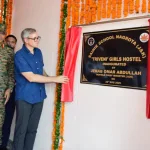Srinagar: For decades, casual labourers and daily wagers in Jammu and Kashmir have been the unsung workforce of the region, providing essential services across various government departments. Despite their years of dedicated service, these workers continue to remain in limbo, awaiting the regularisation of their jobs, a promise that successive governments have failed to deliver.
Casual workers employed in key departments such as the Power Development Department (PDD) and Jal Shakti have played an indispensable role, especially during emergencies. They have worked tirelessly to restore essential services under challenging conditions, often risking their lives. Tragically, some have even lost their lives in the line of duty, leaving their families without adequate compensation or support. “During crises, we are on the frontlines, yet we remain the most neglected segment,” said Feroz Ahmad, a casual worker.
Riyaz Wani, another casual worker, said, “We have been serving for years, fulfilling our duties diligently. But when it comes to securing our future, we are left waiting endlessly.”
For many casual workers, the lack of job security is compounded by delayed wages, leaving them in dire financial straits. Farooq Mir, a casual worker who has spent 23 years in the role, said, “Our wages are pending from months. My family urges me to quit, but this is the only job I know.”
Others, like Khurshid Ganai, are grappling with growing debts and an inability to meet their families’ basic needs. “The situation is dire. Clearing our pending wages would bring some relief,” he said. Ganai’s situation is not unique; many workers are finding it hard to make ends meet as rising inflation adds to their financial struggles.
Sajjad Ahmad Parra, president of Jammu and Kashmir Casual labourers and Daily Wagers Forum (JKCLDWF), voiced the concerns of many workers, urging immediate action. “Casual labourers are the backbone of the departments they serve, yet they face constant mistreatment. Despite their hard work, they are denied basic rights and benefits,” he said. “For decades, we’ve shouldered the bulk of the workload in various departments, yet remain in precarious positions with no job security.”
Parra highlighted that workers will continue to earn just Rs 311 per day, significantly lower than what is paid in other states, until a regularisation policy is implemented. He also called for budget preparations to be made in line with the Minimum Wages Act.
He urged CM Omar Abdullah and his ministers to ensure that departments under their jurisdiction comply with orders from the Central Ministry of Labour when preparing the budget. Furthermore, Parra stressed that if the government is considering a regularization policy, it must involve worker representatives in the decision-making process.
Regarding the pending wages, Parra stated, “Casual labourers work tirelessly but remain among the most underserved. Many are still awaiting their overdue wages, which adds to their distress. For many of them, these wages are essential to support their families.” He appealed to the government to release all pending wages of casual labourers employed in government departments.
In March 2024, the High Court of Jammu & Kashmir had also ruled that individuals who have been engaged temporarily but continuously for over seven years cannot be denied the benefits of regularisation under the relevant SRO.
Interestingly, the regularisation of casual workers has been a recurring theme in political manifestos. Over the years, successive administrations, such as the National Conference (2009-2014), the coalition government of the People’s Democratic Party and Bharatiya Janata Party (2015-2018), and now the current administration of Omar Abdullah-led National Conference, have made commitments to address this issue.
The National Conference (NC) reiterated its commitment to this cause in its assembly poll manifesto released on August 19 2024, pledging to regularise casual workers and daily wagers. In November 2024, Senior NC leader Tanvir Sadiq also underscored this promise, stating, “The government is duty-bound to regularise all daily-wagers, casual labourers, and need-based employees as promised in our poll manifesto.”
Imran Nabi Dar, spokesperson for the National Conference (NC), when contacted by Rising Kashmir for an update, said, “The government is actively considering the issue. Discussions are ongoing, and a final decision will be made soon. We are committed to ensuring fair remuneration for these workers under the Minimum Wages Act.”
As these workers continue to wait for a resolution, their struggle highlights the need for more equitable policies that recognise the contributions of all employees, especially those who have served in challenging conditions for decades.








